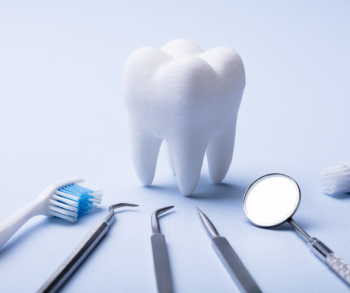Celebrate National Dental Hygiene Month With Better Oral Care
October 1, 2024

Each October is National Dental Hygiene Month. If you’ve noticed that your elderly loved one doesn’t seem to be caring for his teeth to the best of his ability, this month is a great time to begin that discussion.
Why is Dental Hygiene Important for Seniors
Many seniors stop thinking about their teeth as much as they did when they were younger. Perhaps it’s a lack of vanity (no longer so concerned about having shiny white teeth), or it might be because they feel with everything else they have to manage with their health, their teeth fall to the bottom of the list. Finally, for some seniors, as their cognitive ability begins to decline, they simply forget important daily care steps.
How To Tell If Your Loved One Isn’t Caring for His Teeth
- Bad Breath. There are several reasons for bad breath, but one of the most common ones is a lack of oral care. Without daily brushing and flossing, food particles remain trapped in areas of the mouth and bacteria grow, causing bad breath.
- Tooth discoloration. You might begin to notice the teeth are more yellow than normal or that you can see build-up between the teeth.
- Gums receding. If your loved one is “getting long in the tooth,” that may be because his gums are receding and more teeth are showing. You might also notice that his gums seem swollen or inflamed.
- Loose teeth. A tooth that has been severely affected by a cavity or gum disease may become loose and fall out.
Steps for Better Oral Hygiene for Your Elderly Loved One
Once you’ve got your loved one on board to take better care of his teeth, he might need some help in the process. Some of these tips are old and true, while others might be new to him.
- Brush twice daily with fluoride toothpaste. For some seniors, brushing might become difficult as certain health conditions may prevent them from holding a toothbrush or putting toothpaste on a toothbrush. Having a personal care at home provider who visits daily to help him brush is one way to make sure he brushes his teeth at least once a day.
- Floss at least once a day. Those same problems for brushing may impede his ability to floss. Talk to his personal care at home provider about helping him floss as well. You might also look at other flossing instruments to make the task easier for him.
- Attend regular dentist visits. Now is not the time to skip those regular cleanings and inspections from his dentist. The dentist may see problems before your loved one will and be able to find solutions before they escalate. If cognitive problems lead to your loved one forgetting important appointments like this, arrange for transportation from a personal care at home provider to ensure he doesn’t miss his appointment.
- Inspect his mouth. Once a week, get out a little flashlight and look around the mouth for any sores, lumps, or other anomalies that may be developing. This is another task that it helps to have someone like a personal care at home provider do since seeing inside his mouth may be difficult.
With proper care and maintenance, your loved one will have a beautiful smile again in no time.
If you or your loved one is looking for Personal Care at Home in Los Gatos, CA, please call Familiar Surroundings Home Care.
Santa Clara County: (408) 979-9990
San Mateo County: (650) 353-9777
Santa Cruz County: (831) 480-3990


